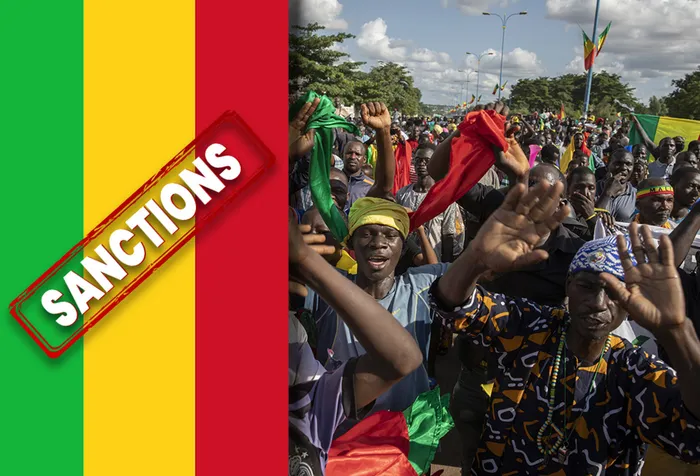Why Malians don’t deserve to be sanctioned

Graphic: Timothy Alexander/African News Agency (ANA) – The 2021 sanctions on Mali were the harshest ever imposed on the country and they hurt millions of vulnerable people, many of whom believed the coup d’état that year against a French-backed regime, was necessary to liberate them from a power-hungry, corrupt, incompetent government.
By Delcio Maianhi
International economic sanctions against the impoverished West African country of Mali will punish the very people fighting for democracy, freedom, and a better future for their society.
The 2021 sanctions on Mali were the harshest ever imposed on the country and they hurt millions of vulnerable people, many of whom believed the coup d’état that year against a French-backed regime, was necessary to liberate them from a power-hungry, corrupt, incompetent government. That regime ignored nationwide protests demanding President Ibrahim Boubacar Keita (IBK) resign.
About 7.5 million people, a third of the country’s population, are in need of humanitarian aid. Thirteen NGOs including the International Rescue Committee and Action Against Hunger and Plan International are pleading to the international community to ease the new sanctions that affect access of humanitarian aid to the vulnerable population who are heavily affected by the food crisis, insecurity, and Covid-19.
The group argues that new “sanctions will have devastating consequences for the people and the humanitarian situation in Mali. The people of Mali already face the worst food insecurity seen in 10 years”. The food crisis worsened due to insurgency from the north, forcing the country to export approximately 70 percent of its food. But the sanctions prevent Mali from importing.
Mali is a landlocked country, surrounded by members of the Economic Community of West African States (Ecowas) and non-Ecowas members. The country relies on its Ecowas neighbours’ seaports for import and export. Therefore, restricting access to these ports affects millions of Malians.
Prices of basic commodities began to rise due to the sanctions and with no access to the seaports and closure of borders, many traders in Mali run the risk of going out of business as their goods are stranded in neighbouring ports. Goods such as vegetables, meat, and onions became “expensive” for many Malians. But why did the international community resort to using economic sanctions?
This is because the international community believes that economic sanctions would coerce the military junta to return power to civilian rule, release the political prisoners and return to the barracks. In addition to that, the sanctions are also aimed to isolate Mali from the rest of the world, cripple its economy and inspire Malian citizens to demand a quicker election from the military. But it backfired because the international community and Malian citizens do not share the same sentiment about IBK’s government.
The international community saw IBK’s government as a democratically elected government that was illegally removed from power in 2020 by the army in a coup, while the Malian citizenry saw it as corrupt and incompetent. They demanded it step down. The government was often widely accused of corruption that triggered large demonstrations in the country. An estimated CFA70 billion was lost through fraud and mismanagement while $40 million was used to purchase a presidential jet for IBK’s government.
IBK was also accused of nepotism when he appointed his son Karim Keita as the president of the national assembly defence committee, while other extended family held high-profile positions.
Issaka Sibibe, his father-in-law, was president of the national assembly and former minister of investment.
These acts of corruption robbed many Malians of education, health, jobs, and security. Hence, the economic sanctions that were supposed to turn Malians against its military government instead turned them against the international community, awakening a feeling of patriotism.
Malians took to the streets to demonstrate their dissent against the sanctions and support the military junta with the coup.
In fact, in the 2020 coup, thousands of Malians celebrated the removal of an unpopular government, with many gathered in Bamako’s Independence Square to the sound of vuvuzelas declaring victory over IBK and his government. Talking to news agencies, Mariam Cissé, an opposition supporter said: “I am overjoyed, we won. We came here to thank all the people of Mali because it is the victory of the people.”
Ousmane Diallo, a retired soldier said: “IBK has failed … The people are victorious,” but he warned, “the military should not be thinking now that they can stay in power”. The coup came after months of anti-government protests demanding IBK resign due to corruption that created poor socio-economic conditions and opened the country to instability.
Sanctioning Mali under these circumstances sends the wrong message to the Malian people.
Western and Ecowas support IBK’s corrupt government and neglect the suffering Malian people. It is for these reasons that I argue that Mali should have not been sanctioned by Ecowas. It is a wrong move that has created tension between Ecowas and Mali, and has failed to solve Mali’s crisis.
As argued by Dr Antwi-Danso, the Dean at the Ghana Armed Forces Command and Staff College, said, “Ecowas must help those countries to step up and get a workable constitution which will help the country, rather than insipid sanctions that do not work”.
Delcio Maianhi is an Honours Student at the University of Johannesburg
This article was written exclusively for The African. To republish, see terms and conditions.